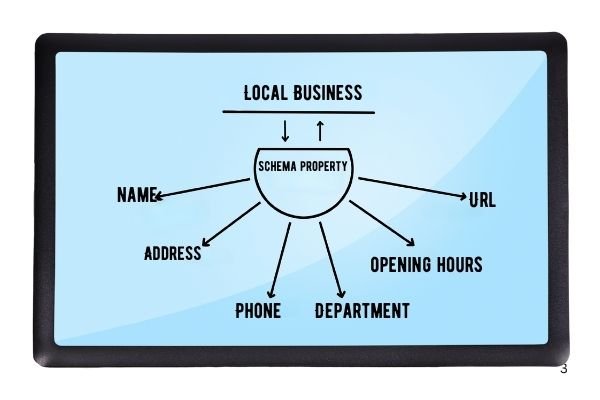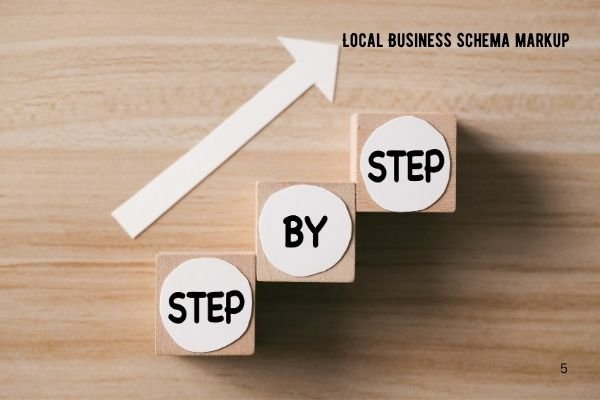What Is The Role Of Schema In Local SEO And How To Use It?
Schema markup is structured data code that helps search engines understand your local business information and display enhanced search results. LocalBusiness Schema Markup specifically enables businesses with physical locations to appear in rich snippets, knowledge panels, and Google’s local search features. For businesses seeking comprehensive digital marketing solutions, implementing LocalBusiness Schema represents a fundamental step toward improving online visibility and search performance.
LocalBusiness Schema provides three key benefits: increased visibility in search results, higher click-through rates, and improved local SEO rankings. This structured data acts as a bridge between your human-readable website content and search engine algorithms, making your business information more accessible to both users and crawlers.
Implementation requires two essential elements: your business name and complete physical address as required properties. Additional recommended properties include telephone numbers, operating hours, geographic coordinates, customer reviews, and price ranges. These elements work together to create comprehensive business profiles in search results.
The markup process involves four critical steps: selecting the most specific business type from Schema.org’s hierarchy, adding required and recommended properties, deploying JSON-LD code to your website, and testing implementation with Google’s validation tools. Proper implementation connects your business to search engine knowledge graphs, establishing credibility and improving local search performance.
This guide covers complete LocalBusiness Schema implementation, from basic setup to advanced multi-location strategies, ensuring your business maximizes its local search visibility and conversion potential.

Understanding LocalBusiness Schema
LocalBusiness Schema Markup refers to specific types and properties from schema.org vocabulary. These help categorize and define local business information clearly.
Use the LocalBusiness schema type mainly for your homepage markup. Adding this markup converts your human-readable content into machine-readable JSON-LD language. This technical implementation forms a crucial component of any comprehensive SEO strategy that aims to improve local search visibility.
In the schema.org system, LocalBusiness is a subtype of Organization and Place. This means it inherits all properties from both parent types.
Schema.org describes LocalBusiness as a specific physical business or organization branch. Examples include restaurants, individual restaurant chain locations, bank branches, medical practices, clubs, and bowling alleys. The definition covers many specific local business categories.
The LocalBusiness type includes numerous subtypes for more precise business definition. Find the complete list in schema.org’s Full Hierarchy section. Indentations show subtype relationships in the term hierarchy.
Check schema.org’s definitions for types relevant to your business. This ensures you select the most accurate type for your specific situation.
Identifying Your Business Type
The next step involves determining which business category fits your optimization needs.
Schema.org offers many business type options as shown above. Choose the most specific type that matches your business perfectly.
Don’t worry if no specific type fits your business well. Select a broader category like LocalBusiness or Organization instead.
LocalBusiness vs Organization Markup: Which Should You Choose?
LocalBusiness is a subtype of Organization, but each has different properties and purposes for rich results. We cover this detail in our “Required and Recommended Properties” section later.
Your choice between LocalBusiness and Organization markup depends on several key factors.
Use LocalBusiness type or its subtypes when your business operates from a physical location with a public address. Choose Organization type for businesses without addresses, like eCommerce stores or service providers making house calls.
Still unsure which type fits your business? Ask yourself these questions:
- First, does your business have a physical location customers visit? If not, Organization type works better.
- Second, does a specific Schema.org type match your business well? Use that specific type if available. Otherwise, choose a broader type and add detailed properties.
Both structured data types help distinguish your business from competitors using structured data properties. This differentiation becomes particularly important when implementing local SEO strategies that target specific geographic markets.
Organization represents the most general business type. When using Organization type, remember these points:
Certain Schema.org properties within Organization type affect visual elements in search results and knowledge panels.
Organization structured data improves brand profiles and merchant knowledge panels. It provides return policies, addresses, and contact information.
Organization Schema Types Available
Organization includes these specific business categories:
- Airline
- Consortium
- Corporation
- EducationalOrganization (cover basic business structures. EducationalOrganization includes College, University, Elementary School, High School, Middle School, Preschool, and School.), FundingScheme
- GovernmentOrganization
- LibrarySystem
- LocalBusiness
- MedicalOrganization (covers healthcare businesses including Dentist, Hospital, Pharmacy, and Physician practices.)
- NGO
- NewsMediaOrganization
- OnlineBusiness address nonprofit and digital organizations.
- PerformingGroup (Includes Dance Group, Music Group, and Theatre Group for entertainment businesses.)
- Project (covers FundingAgency and ResearchProject for project-based organizations.)
- ResearchOrganization
- SearchRescueOrganization
- SportsOrganization
- WorkersUnion
These complete the organizational types available for structured data implementation.
LocalBusiness Schema Types Available
LocalBusiness offers extensive specific categories for different business types:
- AnimalShelter
- ArchiveOrganization
- AutomotiveBusiness (starts the comprehensive list. AutomotiveBusiness includes AutoBodyShop, AutoDealer, AutoPartsStore, AutoRental, AutoRepair, AutoWash, GasStation, MotorcycleDealer, and MotorcycleRepair.)
- ChildCare, Dentist
- DryCleaningOrLaundry
- EmergencyService (includes FireStation, Hospital, and PoliceStation for public safety organizations.).
- EmploymentAgency
- EntertainmentBusiness (serve specialized sectors. EntertainmentBusiness covers AdultEntertainment, AmusementPark, ArtGallery, Casino, ComedyClub, MovieTheater, and NightClub.)
- FinancialService (includes AccountingService, AutomatedTeller, BankOrCreditUnion, and InsuranceAgency.)
- FoodEstablishment (offers many options: Bakery, BarOrPub, Brewery, CafeOrCoffeeShop, Distillery, FastFoodRestaurant, IceCreamShop, Restaurant, and Winery.).
- GovernmentOffice (includes PostOffice for official services.)
- HealthAndBeautyBusiness (covers BeautySalon, DaySpa, HairSalon, HealthClub, NailSalon, and TattooParlor.)
- HomeAndConstructionBusiness (includes Electrician, GeneralContractor, HVACBusiness, HousePainter, Locksmith, MovingCompany, Plumber, and RoofingContractor.)
- InternetCafe
- LegalService (Attorney, Notary)
- Library.
- LodgingBusiness (includes BedAndBreakfast, Campground, Hostel, Hotel, Motel, and Resort.)
- MedicalBusiness (offers extensive healthcare options including CommunityHealth, Dentist, Dermatology, DietNutrition, Emergency, Geriatric, Gynecologic, MedicalClinic, Midwifery, Nursing, Obstetric, Oncologic, Optician, Optometric, Otolaryngologic, Pediatric, Pharmacy, Physician, Physiotherapy, PlasticSurgery, Podiatric, PrimaryCare, Psychiatric, and PublicHealth.).
- ProfessionalService
- RadioStation
- RealEstateAgent
- RecyclingCenter
- SelfStorage
- ShoppingCenter
- SportsActivityLocation (includes BowlingAlley, ExerciseGym, GolfCourse, HealthClub, PublicSwimmingPool, SkiResort, SportsClub, StadiumOrArena, and TennisComplex.).
- Store (provides the largest selection: AutoPartsStore, BikeStore, BookStore, ClothingStore, ComputerStore, ConvenienceStore, DepartmentStore, ElectronicStore, Florist, FurnitureStore, GardenStore, GroceryStore, HardwareStore, HobbyShop, HomeGoodsStore, JewelryStore, LiquorStore, MensClothingStore, MobilePhoneStore, MovieRentalStore, MusicStore, OfficeEquipmentStore, OutletStore, PawnShop, PetStore, ShoeStore, SportingGoodsStore, TireShop, ToyStore, and WholealeStore.).
- TelevisionStation
- TouristInformationCenter
- TravelAgency
Completes the LocalBusiness schema options.

Essential Properties for LocalBusiness Schema Success
LocalBusiness provides unique properties that create specific functions in Local Business rich search results. Google documents the exact requirements for LocalBusiness markup to qualify for enhanced search visibility.
Below are the required fields as they appeared when we published this guide. You must complete all required properties to make your content eligible for rich results display. Recommended properties enhance your structured data with additional information that improves user experience.
LocalBusiness Schema Properties Guide
| Schema Property | Priority | Mapping | Notes |
| address | Required | PostalAddress | The physical location of the business. Include as many properties as possible. More properties create higher quality results for users. |
| name | Required | The name of the business. | |
| aggregateRating | Recommended | aggregateRating | The average rating of the local business from multiple ratings or reviews. Only recommended for sites capturing reviews about other local businesses. |
| department | Recommended | LocalBusiness | A nested item for a single department. |
| geo | Recommended | GeoCoordinates | Geographic coordinates of the business. |
| openingHoursSpecification | Recommended | OpeningHoursSpecification | Hours when the business location operates. |
| priceRange | Recommended | The relative price range of a business. Specify using numerical range like “$10-15” or currency signs like “$$$”. | |
| review | Recommended | Review | A review of the local business. Only recommended for sites capturing reviews about other local businesses. |
| telephone | Recommended | A business phone number for primary customer contact. Include country code and area code in the phone number. | |
| url | Recommended | The fully-qualified URL of the specific business location. Unlike @id property, this URL should be a working link. |
GeoCoordinates Schema Properties
Google recommends the following types: GeoCoordinates and OpeningHoursSpecification. Adding these to your markup creates more robust rich results. These recommended types have their own required and recommended properties:
| Schema Property | Priority | Mapping | Notes |
| latitude | Required | Number | The latitude of the business location. The precision should be at least 5 decimal places. |
| longitude | Required | Number | The longitude of the business location. The precision should be at least 5 decimal places. |
TIP: Don’t know your business’ geo coordinates? They can be found by searching for the associated address in Google Maps. The URL of the location will have both the latitudinal and longitudinal values.
OpeningHoursSpecification Schema Properties
| Schema Property | Priority | Mapping | Notes |
| closes | Required | Time | The time the business location closes, in hh:mm:ss format. |
| dayOfWeek | Required | One or more of the following: Monday, Tuesday, Wednesday, Thursday, Friday, Saturday, Sunday | |
| opens | Required | Time | The time the business location opens, in hh:mm:ss format. |
| validFrom | Recommended | Date | The start date of a seasonal business closure, in YYYY-MM-DD format. |
| validThrough | Recommended | Date | The end date of a seasonal business closure, in YYYY-MM-DD format. |
TIP: If certain days have different opening hours, create a separate OpeningHoursSpecification data item for those days.
FoodEstablishment Schema Properties
| Schema Property | Priority | Mapping | Notes |
| menu | Recommended | URL | The fully-qualified URL of the menu. |
| servesCuisine | Recommended | The type of cuisine the restaurant serves. |
As you can tell from the number of properties at your disposal, there’s a lot you can leverage with your LocalBusiness Schema Markup. Understanding these technical details becomes essential when working with web design professionals who implement structured data across your website architecture.
TIP: For the most current guidelines on required and recommended fields, reference the Google documentation on Local Business markup.

Planning Your LocalBusiness Schema Markup
Prep with the table below to speed up markup. Use our Google Sheets template for guidance.
| Schema Property | Field in English | Description & Guidance |
| type | Local Business Type | Choose the most specific Local Business type (e.g., BarOrPub). |
| url | Website URL | Include http:// and or https:// |
| name | Business name | Use the business name exactly as shown in your NAP listings. |
| address | Address | Use the same address as in your directory listings and NAP. |
| sameAs | Social Media profiles or listings | Link to social profiles or directories that represent the same business shown on the page. |
| description | Description of the Business | Use the description visible on your page or your meta description. |
| hasMap | Map | If a map appears, include it. Find your business on Google Maps, click “Share,” and copy the URL. |
| geo | Latitude and Longitude | Enter your address to retrieve latitude and longitude. |
| telephone | Telephone Number | Country Code and Number. Use format +X-XXX-XXXX or +XX-XXXXXXX |
| image | Image | Copy the image URL by right-clicking it or use one from your media folder. |
| logo | Logo | Link to your logo image by copying its URL from the site or media folder. |
| openingHoursSpecification | Opening Hours | List business days and hours, including holiday schedules. Use 24-hour format (HH:MM:SS). Example: Mon–Fri 11:30:00–00:00:00; Sat–Sun 11:00:00–00:00:00. |
| menu | Menu URL | URL to the menu on the website if applicable. |
| acceptsReservations | Restaurants only | Yes/No |
| servesCuisine | Type of Cuisine. Restaurants only | What type of cuisine serve? |
| aggregateRating | Average Rating from business’s reviews | Use on-site reviews from third-party apps and your average rating becomes the aggregate rating. |
Schema markup defines homepage elements as unique entities, boosting E-E-A-T and linking your local business to the web, especially when paired with full-spectrum marketing services.
Adding Schema Markup for Multiple Business Locations
If your business operates multiple locations, several markup strategies work depending on your site architecture.
When the business on the homepage DOES NOT have an address, use the Organization type.
First option: If other locations and their addresses appear on the homepage, select the Organization’s subOrganization property. Create LocalBusiness markup for each location.
Second option: If each location has its own page, create separate LocalBusiness data items for each location page. From each LocalBusiness data item, use either parentOrganization or branchOf property to connect back to the main Organization data item.
When the business on the homepage DOES have an address and serves as headquarters, use LocalBusiness or more specific subtypes.
First option: If other locations and their addresses appear on the homepage, select the main LocalBusiness’s subOrganization property. Create LocalBusiness markup for each subsidiary location.
Second option: If each subsidiary location has its own page, create separate LocalBusiness data items for each location page. From each subsidiary LocalBusiness data item, use either parentOrganization or branchOf property to connect back to the main LocalBusiness data item.
If subOrganization, parentOrganization, or branchOf properties don’t adequately describe relationships between your entities, use the Schema Paths tool. This shows all available properties for the types you’re connecting. Multi-location businesses often benefit from specialized consulting services to ensure proper implementation across all business locations.

Creating LocalBusiness Schema Markup
- Step One: Add Required Properties Add the required schema.org properties for LocalBusiness structured data markup using our reference above. We recommend established tools and validators, but many different options exist including specialized schema markup generators and SEO analysis tools that can streamline the implementation process.
- Step Two: Follow Google’s Structured Data Guidelines Check that your Schema Markup follows Google’s structured data guidelines. These guidelines ensure your markup meets quality standards and avoids common implementation errors that could prevent rich results eligibility.
- Step Three: Deploy Your Markup If you feel satisfied with your markup, ensure your integration method is set up and the markup will deploy to your page. Google recommends using JSON-LD, which is also our favorite format for deployment. This technical implementation often requires coordination between marketing teams and development resources.
- Step Four: Test Your Markup Test that your Schema Markup works using Google’s Rich Results Testing Tool and the Schema Markup Validator. These validation tools identify syntax errors and confirm your markup’s eligibility for enhanced search features.
Checking Your LocalBusiness Schema Markup
- The Schema Markup Validator The Schema Markup Validator (SMV) validates your Schema.org syntax. Note that it does not show your eligibility for rich results. This is where the Rich Results Testing Tool comes in handy for comprehensive validation and preview functionality.
- Rich Results Preview Testing To validate and preview your structured data, use Google’s Rich Result Test. This tool indicates if your page qualifies for rich results. Note that Google’s Rich Result Test only works for certain supported rich result types.
Managing Your Existing Schema Markup
Schema Markup constantly evolves and is not something you can set and forget. It offers limitless possibilities beyond just your homepage markup. We provide tips to manage existing markup and leverage new opportunities.
1. Maintain Your LocalBusiness Schema Markup
Update your Schema Markup based on content changes on your site and updates to Google’s documentation. Regular maintenance ensures your structured data remains accurate and continues supporting your local SEO efforts across different geographic markets.
Google recently began posting all structured data changes on their “What’s new” page. Monitoring this helps you stay current with any changes affecting structured data implementation and rich results eligibility.
Another great resource is Google’s Webmasters Blog. You can subscribe via email and receive all the latest news directly in your inbox. This proactive approach to staying informed helps maintain optimal schema markup performance over time.
2. Expand Your LocalBusiness Schema Markup
Finished your homepage markup? Great! Next, explore schema types for other key pages. Use the tutorials below for step-by-step guidance.
- Contact Us If you have a “Contact Us” page on your website, create a ContactPage data item and connect various location types and phone numbers as ContactPoints. For example, if you have a sales line and technical support line, create these as ContactPoint data items. Link them to the ContactPage data item using the “main entity” property. This implementation works particularly well when integrated with comprehensive contact optimization strategies that improve user experience and conversion rates.
- About Us
Use the AboutPage schema markup for your About page. While it doesn’t require specific fields, you can add relevant ones like author, description, and mainEntity. Link this page to your homepage’s LocalBusiness entity using the about property. This reinforces your site structure and improves semantic relationships for search engines. - News
For news articles, implement NewsArticle schema using a plugin or manual JSON-LD. Like blog posts, link each article back to your LocalBusiness entity. This approach boosts content authority and supports SEO for timely updates. - Product
Use Product schema for each product page to qualify for rich results in search. Include key fields like name, image, brand, offers, and aggregateRating. For larger catalogs, coordinate with a dev or use eCommerce tools that support structured data.
Professional implementation services, such as those offering Google Ads management and integrated marketing solutions, can help businesses maximize the benefits of comprehensive schema markup across all website sections and business locations including Las Vegas market optimization.
TIP: Always link other page markups back to your homepage—it anchors your content in the knowledge graph and boosts clarity for search engines.
Conclusion
LocalBusiness Schema Markup transforms how your business appears in search results by converting human-readable content into machine-readable code. This structured data connects your business to search engine knowledge graphs, boosting visibility and click-through rates. Start by choosing the most specific schema type for your business, then add required properties like name, address, and contact information. Include recommended properties such as opening hours, reviews, and geographic coordinates to enhance your rich results eligibility. Test your markup using Google’s validation tools and maintain it regularly as your business evolves. Remember to expand beyond your homepage by adding schema to contact pages, blog posts, and product pages. Each markup element should connect back to your main business entity, creating a comprehensive web of structured data. This strategic approach to LocalBusiness Schema Markup will help your business stand out in local search results and drive more qualified traffic to your website.
Frequently Asked Questions
1. What is LocalBusiness Schema and why do I need it?
LocalBusiness Schema is structured data markup that helps search engines understand your business information better. It makes your business eligible for rich search results with enhanced displays. This markup converts your website content into machine-readable language. Rich results typically generate higher click-through rates and increased organic traffic.
2. Should I use LocalBusiness or Organization schema for my business?
Use LocalBusiness schema when your business has a physical location with a public address. Choose Organization schema for businesses without physical addresses like eCommerce stores or service providers. LocalBusiness is a subtype of Organization but offers different properties for rich results. If unsure, ask whether customers visit your physical location regularly.
3. What are the required properties for LocalBusiness Schema?
The two required properties for LocalBusiness Schema are name and address. The name should match your business listings and directory information exactly. Address must include your complete physical location with detailed properties. Additional recommended properties include telephone number, opening hours, geographic coordinates, and website URL.
4. How do I handle multiple business locations with schema markup?
For multiple locations, your strategy depends on your website architecture and homepage setup. If your homepage lacks an address, use Organization type with subOrganization properties. If your homepage has an address, use LocalBusiness type. Create separate data items for each location page and connect using parentOrganization properties.
5. How do I test and maintain my LocalBusiness Schema markup?
Use Google’s Rich Results Testing Tool and Schema Markup Validator to test your implementation. The Rich Results Testing Tool shows eligibility for enhanced search results. Schema Markup Validator checks your syntax for proper formatting. Maintain your markup by updating it when business information changes or Google releases new guidelines.

Mike has over 5 years of experience helping clients improve their business visibility on Google. He combines his love for teaching with his entrepreneurial spirit to develop innovative marketing strategies. Inspired by the big AI wave of 2023, Mike now focuses on staying updated with the latest AI tools and techniques. He is committed to using these advancements to deliver great results for his clients, keeping them ahead in the competitive online market.
